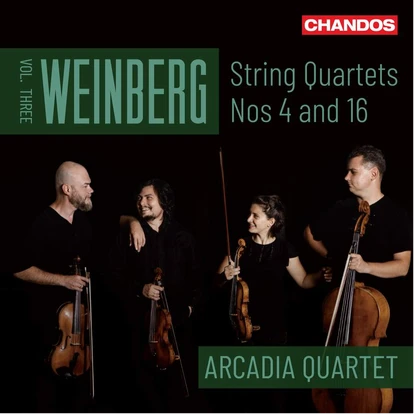String Quartets, Vol. 3 – Arcadia Quartet
Arcadia Quartet’s Interpretation of Weinberg’s String Quartets, Vol. 3
In the latest installment of their exploration into Mieczysław Weinberg’s string quartets, the Arcadia Quartet presents a powerful rendering that delves into the intricate emotional landscapes of the composer’s works. Released under the Chandos label, this album brings together two contrasting pieces, offering a glimpse into the quartet’s profound connection with Weinberg’s compositions.
At the core of this release stands Weinberg’s Fourth Quartet, composed in 1945. The Arcadia Quartet adeptly captures the multifaceted nature of this composition, which unfolds like a poignant narrative. Their performance navigates the shifting emotional tones, from the initial tranquil pastoral passages to the gradual emergence of foreboding undertones that permeate the piece. The second movement, marked by echoes of Bartók, showcases the quartet’s technical prowess, infusing the work with bursts of energy. The mournful Largo marciale follows, a poignant reflection on the wounds of war. The Arcadia Quartet conveys the weight of this movement with a deep sense of empathy, immersing the listener in Weinberg’s realm of sorrow and remembrance.
Weinberg’s 16th Quartet, composed in 1981 as a tribute to his sister Ester, who tragically fell victim to the German occupation of Poland, further showcases the quartet’s interpretive skills. In this piece, the quartet skillfully captures the intricate layers of emotion and subtlety. Hints of Bartók’s influence are discernible, particularly in the scherzo’s spectral repeated fourths, which are executed with an eerie elegance. Additionally, the quartet adeptly integrates the strains of Jewish folk music, infusing the outer movements with a poignant nostalgia.
The Arcadia Quartet’s performances underscore their profound affinity with Weinberg’s compositions. Their dedication and technical precision are evident, allowing for seamless transitions between moments of vulnerability and dynamism. The unity of each member’s virtuosity within the ensemble creates a harmonious and impactful musical statement.
A notable highlight of this recording is the meticulous sound engineering. The recording captures the quartet’s performance nuances, offering listeners an intimate and clear auditory experience. This attention to detail enhances the music’s overall impact, allowing even the most delicate intricacies to shine.
In summary, the third volume of the Arcadia Quartet’s exploration of Weinberg’s quartets is a demonstration of their profound interpretation and emotional depth. Their ability to convey the multifaceted aspects of Weinberg’s works showcases their deep familiarity with the composer’s musical language. With unwavering commitment, the Arcadia Quartet continues to pay homage to Weinberg’s legacy, inviting audiences to engage with the composer’s contemplations on life, loss, and hope.

